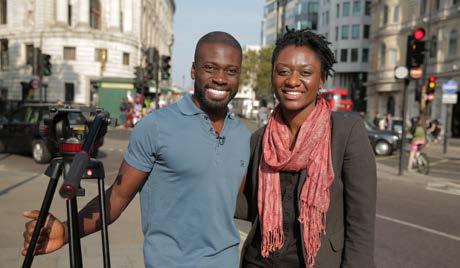
2 minute read
British Ghanaians: Lost in translation documentary
British Ghanians: Lost in translation
PAMELA SAKYI, BA COMMUNICATIONS AND MEDIA, BRUNEL.
Advertisement

The Ghanaian Diaspora in London is facing a Language Endangerment crisis. Language Endangerment occurs when a language is at risk of dying out because it’s speakers stop speaking it, or stop passing their language on to the next generations, instead they choose to communicate in a different language, such as English.
Levels of fluency amongst some 2nd generation Ghanaians in London are at an all-time low. As a result many feel disconnected from their family in Ghana and also feel disconnected from their rich cultural heritage. British Ghanaians: Lost In Translation explores this issue of Language Endangerment, Its root causes and what can be done to inspire a Ghanaian language fluency revival. The pressure to maintain the language and culture on this side of the Motherland, is further enhanced by a prevalent mind set in Ghana, that speaking English is more favourable than native Ghanaian languages.

Recent migrants to the UK perpetuate this mindset by refusing to teach their children a Ghanaian language, preferring English. There are many documented accounts of children in Ghana being punished for speaking in their native tongue. English is actually the official language of Ghana. However, I argue in my documentary that whilst speaking a dominant language like English may make you more globally relevant and help your career prospects, it is also crucial to preserve your cultural heritage and knowing a Ghanaian language is an essential part of such preservation. I also believe that it puts 2nd generation Ghanaians in an advantageous position to visit Ghana and be better equipped to contribute towards its economy in the long term.
Ghanaians have such a wealth of native languages and dialects. Colonialism introduced Ghana to the English language and I believe a colonial mindset is perpetuated when English is favoured over native Ghanaian languages. I believe it is better to be multilingual, which is scientifically proven to have substantial long-lived cognitive, social, personal, academic, and professional benefits.
By 2050 it is estimated that more than half of the world’s languages will die out due to more people choosing to and being encouraged to speak a dominant language such as English, Mandarin, Arabic, Portuguese, Spanish or French. When a community loses its languages it loses a sense of its rich cultural history, identity, heritage and roots, inherent in the languages and it also loses the power to represent itself in a unique way.
The documentary also highlights what it is like to be of a dual identity (mainly British and Ghanaian) and how factors of language and fluency play an important role. As a British Ghanaian myself, I spent a huge part of my life not knowing how to speak my mother’s language, Brong Twi. This meant being excluded from family conversations, jokes, stories, proverbs, idioms etc. I prided myself on being British and associated being African with a certain awkwardness and insecurity. In recent years I have been learning Twi proactively and more intensively and as a result I have been able to come to a deeper understanding of Ghanaian culture, practices and history, which has developed me as a British Ghanaian person on the whole. It is a huge advantage and I actually feel more ‘complete’ and ‘wholesome’. I have travelled to Ghana recently and have been shocked by many areas where language endangerment is happening. Yet I speak to some 2nd generation Ghanaians in the UK and they do not realise what is at stake.









